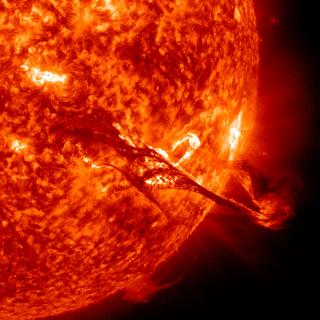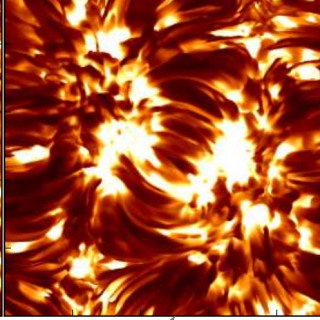Bibcode
Asensio Ramos, A.; Olspert, N.
Referencia bibliográfica
Astronomy and Astrophysics
Fecha de publicación:
2
2021
Revista
Número de citas
16
Número de citas referidas
16
Descripción
Context. Observations from ground-based telescopes are severely perturbed by the presence of the Earth's atmosphere. The use of adaptive optics techniques has allowed us to partly overcome this limitation. However, image-selection or post-facto image-reconstruction methods applied to bursts of short-exposure images are routinely needed to reach the diffraction limit. Deep learning has recently been proposed as an efficient way to accelerate these image reconstructions. Currently, these deep neural networks are trained with supervision, meaning that either standard deconvolution algorithms need to be applied a priori or complex simulations of the solar magneto-convection need to be carried out to generate the training sets.
Aims: Our aim here is to propose a general unsupervised training scheme that allows multiframe blind deconvolution deep learning systems to be trained with observations only. The approach can be applied for the correction of point-like as well as extended objects.
Methods: Leveraging the linear image formation theory and a probabilistic approach to the blind deconvolution problem produces a physically motivated loss function. Optimization of this loss function allows end-to-end training of a machine learning model composed of three neural networks.
Results: As examples, we apply this procedure to the deconvolution of stellar data from the FastCam instrument and to solar extended data from the Swedish Solar Telescope. The analysis demonstrates that the proposed neural model can be successfully trained without supervision using observations only. It provides estimations of the instantaneous wavefronts, from which a corrected image can be found using standard deconvolution techniques. The network model is roughly three orders of magnitude faster than applying standard deconvolution based on optimization and shows potential to be used on real-time at the telescope.
Aims: Our aim here is to propose a general unsupervised training scheme that allows multiframe blind deconvolution deep learning systems to be trained with observations only. The approach can be applied for the correction of point-like as well as extended objects.
Methods: Leveraging the linear image formation theory and a probabilistic approach to the blind deconvolution problem produces a physically motivated loss function. Optimization of this loss function allows end-to-end training of a machine learning model composed of three neural networks.
Results: As examples, we apply this procedure to the deconvolution of stellar data from the FastCam instrument and to solar extended data from the Swedish Solar Telescope. The analysis demonstrates that the proposed neural model can be successfully trained without supervision using observations only. It provides estimations of the instantaneous wavefronts, from which a corrected image can be found using standard deconvolution techniques. The network model is roughly three orders of magnitude faster than applying standard deconvolution based on optimization and shows potential to be used on real-time at the telescope.
Proyectos relacionados

Magnestismo Solar y Estelar
Los campos magnéticos son uno de los ingredientes fundamentales en la formación de estrellas y su evolución. En el nacimiento de una estrella, los campos magnéticos llegan a frenar su rotación durante el colapso de la nube molecular, y en el fin de la vida de una estrella, el magnetismo puede ser clave en la forma en la que se pierden las capas
Carlos Cristo
Quintero Noda

Magnetismo, Polarización y Transferencia Radiativa en Astrofísica
Los campos magnéticos están presentes en todos los plasmas astrofísicos y controlan la mayor parte de la variabilidad que se observa en el Universo a escalas temporales intermedias. Se encuentran en estrellas, a lo largo de todo el diagrama de Hertzsprung-Russell, en galaxias, e incluso quizás en el medio intergaláctico. La polarización de la luz
Ernest
Alsina Ballester